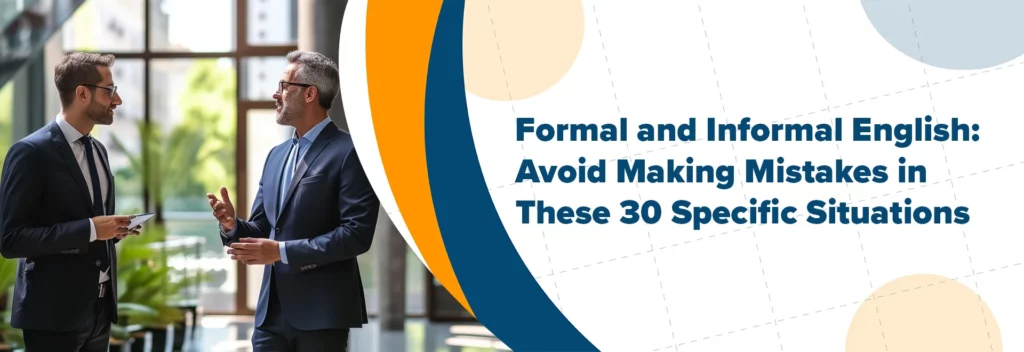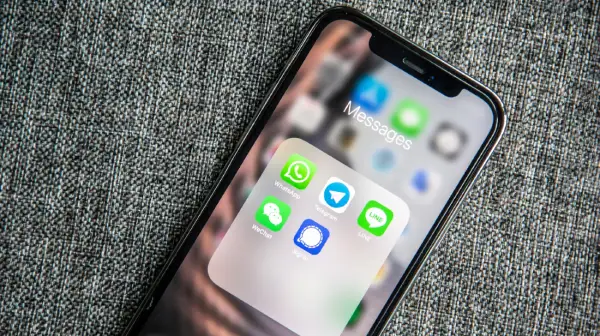
Formal and Informal English: Avoid Making Mistakes in These 30 Specific Situations
Did you ever have a conversation where you think you should have delivered a different approach in your language? This is a common experience for many of us.
When we’re having English conversations with other people, we tend to be more convergent with our interlocutors, especially when we are conversing with our superiors or those who we just met. This means that we are aware of our surroundings and we know what language attitude is appropriate in such situations.
In English writing, our attitude and tone vary for every reader. We tend to be more polite and respectful in our language when writing an email or sending a progress report. This is a form of formal English. If we talk with somebody in casual conversations, our language attitude can be in the form of informal English.
There are various situations where we shift our tone or switch our linguistic styles depending on the person we are talking to.
For example, if you met your boss in the elevator and he greeted you with “Good morning,” how would you respond? Of course, you are expected to reply politely. He would not expect you to say “Hey Boss, how are you doing?” It’s a bit impolite and discourteous.
Another example is when a friend texted you and asked if you could come over to his place, you would not reply with “Thank you for the information. This has been duly noted.” It’s so formal that your friend might think you’ve gone mad.
All of these situations are common and we are just unconscious of them. Basically, when meeting someone for the first time, we casually engage in greetings to small talk. With this, we have to know more about formal and informal English for us to check our language attitude and style when we are in a conversation.
What is Formal English?
You may be unfamiliar with it, but formal English is the way we approach someone using formal language, particularly in situations where we should be serious. These situations can be in business contexts, meetings, conferences, or first time meetings.
Formal English is used in writing. We use formal English when writing business letters, emails, progress reports, academic papers, interviews, or even in English presentations. This does not limit formal English here. Newspapers, magazines, government reports, and other forms of communication use formal English to convey their information to their audience.
When writing, formal English does not use contractions and colloquialisms. It is the standard and polished form of English so it adheres to grammatical rules, precise vocabulary, and a professional tone.
What is Informal English?
On the contrary, informal English is the language style that we use in casual situations like talking to friends, sending text messages to family members, sending postcards to relatives, or communicating with a romantic partner.
Informal English is just similar to friendly conversations. It’s common to use contractions when speaking, or even use jargons and colloquial terms when talking to somebody. In short, informal English is the language used in everyday conversations as well as in social media interactions.
Basically, informal English is not required to adhere to grammatical rules, precise vocabulary, and a professional tone when communicating. Informal English is not the standard, as long as it is intelligible and well-delivered.


Differences between formal and informal English
We will introduce later some specific situations where we can use formal and informal English. Do you know how they differ from each other? Let’s delve into their differences first to better understand them.
Formal English | Informal English |
It adheres to grammatical rules | Not required to observe correct grammar |
Uses precise vocabulary | Synonyms can be used; blending, clipping, or compounding is fine |
Does not use contractions | Contractions are fine and acceptable |
Observes complete sentences with proper punctuation | Incomplete and fragmented sentences so long as it’s intelligible |
Advanced vocabulary | Simple and basic vocabulary |
No usage of slang, jargons, colloquial terms, or idiomatic expressions | Jargons, slang, colloquial terms, and idiomatic expressions are often used |
More from the third-person perspective; rare in the first-person | Either from a first or second-person perspective |
Has a serious and polite tone | Casual and friendly tone |
When to use formal and informal English?
We always consider our audience and the situation when using either formal or informal English. Here are example of adaptable situations where we use formal and informal English.
Formal English: Spoken
- Business meetings and conferences
- Meeting someone for the first time or you don’t know well
- Television news broadcast
- Any speech that has a lot of audience: graduation speech, President’s speech, welcome remarks, introduction of the speaker, etc.
- Business presentations or reporting on progress
- Talking to a superior in the workplace
- Job interviews
- Talking to a teacher, professor, or school head
Formal English: Written
- Academic writing: thesis, dissertation, research papers, essays, etc.
- Cover letters, resume, application letter, and any other form of business letters
- Writing a newspaper article
- Legal documents
- Sending an email or progress report to a superior or client
- Invitation letters or cards
Informal English: Spoken
- Attending informal meetings
- Telling a story to a friend or family member
- Confronting someone
- Asking permission from your parents
- Giving commentary or reaction to a social media post
- Vlogging
- Talking to a sibling
- Joining a reality or game show
- Attending a talk show
- Calling a customer service operator
Informal English: Written
- Posting on social media
- Sending a text message to a friend or colleague
- Sending postcards to friends or family; dedication
- Delivering news to a friend or family member
- Creative writing (novels, poetry, fiction, etc.)
- Holiday cards (Christmas cards, birthday cards, etc.)


We can always use informal or formal language in various specific situations. What we need to consider are our addressee and the context. Shift to the appropriate language style and attitude when necessary.
Example expressions in formal and informal English
Formal: I would like to extend my heartfelt apologies to our customers for the inconvenience.
Informal: I’m sorry for what happened.
Formal: The undersigned hereby authorizes Mr. Jack Brown to sign the documents in my stead.
Informal: Jack Brown can sign for me.
Formal: The employees are extremely grateful for the wonderful opportunity.
Informal: They’re glad for this chance.
Formal: I would like to present to you the data we gathered from our investigation.
Informal: Here’s the data I got from my investigation.
Formal: Hello, good morning. How are you doing?
Informal: Hey there! What’s up?
Formal: Would you mind sending me your progress report by email? I’d appreciate it if you could submit it within the day.
Informal: Email me your progress report today.
Formal: I am interested to learning more about this exciting opportunity.
Informal: I want to know more about the job.
Formal: The researcher initially concluded that students are happier when they study at home.
Informal: At first, she thought that students were happy when studying at home.
Formal: I am writing to inquire about the status of my credit card application.
Informal: I wanna know some updates about my application.
Formal: In conclusion, many employees complained about not having a pay raise.
Informal: Therefore, I conclude that many employees did not receive their salary increase so they got mad.
Formal: We regret to inform you that the delivery of your parcel will be delayed.
Informal: Sorry, your parcel cannot be delivered today.
In the English language, the correct use of formal and informal English is important because it can help us have an effective communication with our addressees. Now that you know the difference and sample situations to use formal and informal English in your conversations and writing, make sure to observe and consider everything in context.
Formal English or Informal English?
These two linguistic styles are acceptable and appropriate when used in the right context with proper language. Remember, your language attitude and style matter when you use formal and informal English in your conversations.




